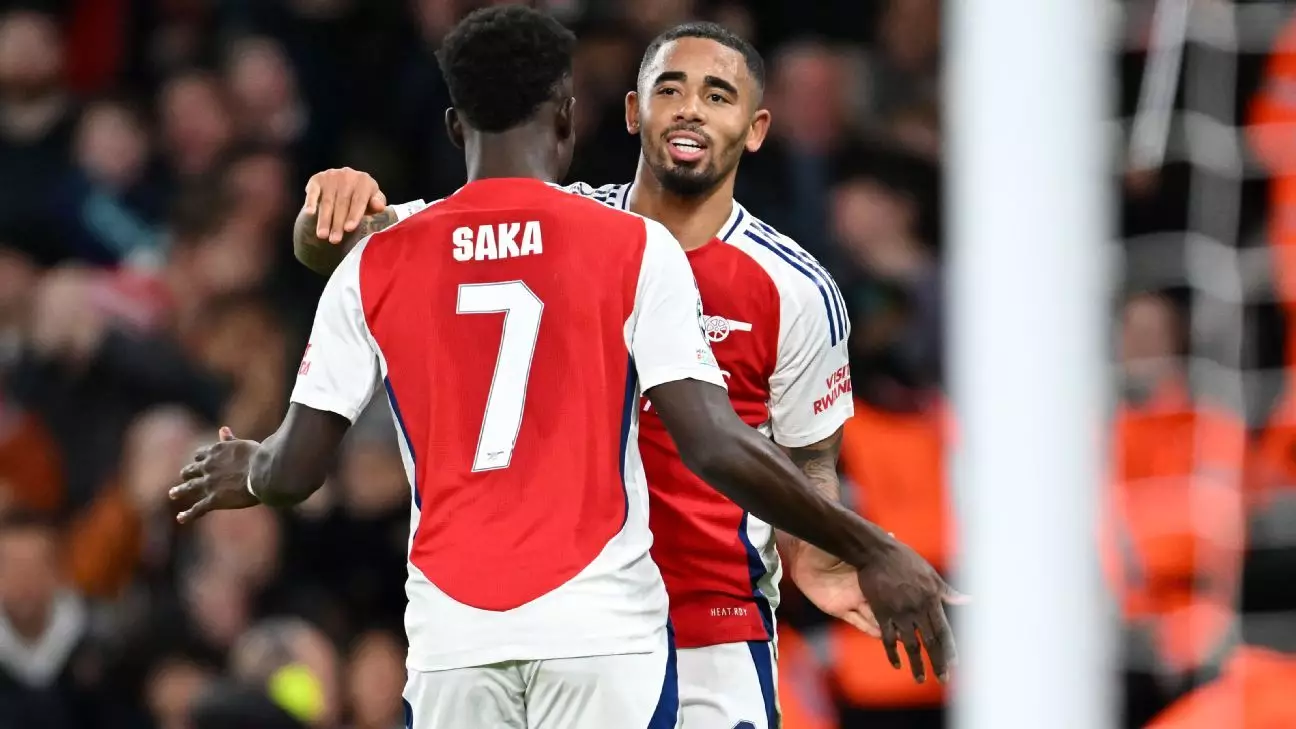After the notable acquisitions of Gabriel Jesus and Oleksandr Zinchenko from Manchester City in the summer of 2022, Arsenal fans were filled with optimism regarding the potential for a new era of success. Both players were seen as vital pieces meant to not only enhance the tactical capabilities of Mikel Arteta’s squad but also to instill a winning mentality within a predominantly young team. However, events unfolding on the pitch suggest a more complex scenario. As Arsenal convincingly defeated AS Monaco 3-0 at the Emirates Stadium during a recent UEFA Champions League match, it raises the question: is the club slowly moving on from these former stars?
Arsenal’s recent victory showcased the remarkable talent of young star Bukayo Saka, whose influential second-half performance overshadowed the struggles of veteran signings Jesus and Zinchenko. While Saka shone brightly with two goals, the contributions from Jesus—who has recently faced criticism due to a lack of scoring—raise concerns about his current standing within the team. In particular, his performance featured two missed opportunities that could have settled the contest much earlier. As the team looks to solidify its place among Europe’s elite, the form and contributions of established players like Jesus and Zinchenko should not be overlooked, yet the emergence of younger talent necessitates reflection on their evolving roles.
At just 22 years old, Bukayo Saka has undergone a remarkable transformation, emerging as an influential force for Arsenal and drawing comparisons with prolific players in the Premier League. Under Arteta’s guidance, Saka has matured, not only demonstrating his technical prowess but also adapting to the rigors of competing at the highest levels of football. As Arteta highlighted, Saka’s growth has been multifaceted; he not only possesses exceptional skill but also embodies an astounding work ethic and ambition. His commitment to improvement shone through as he netted two goals against Monaco, further propelling his status as a crucial player for the club.
Statistically, Saka’s performance stands tall, with nine goals and 12 assists so far this season, placing him among the top contributors in the Premier League. Such impressive achievements place him into the annals of club history by surpassing legend Dennis Bergkamp’s tally in the Champions League. This upward trajectory reinforces the club’s reliance on Saka, intensifying the spotlight on the roles that Jesus and Zinchenko will need to address if they are to remain critical contributors in this evolving Arsenal landscape.
While Jesus and Zinchenko arrived with high expectations, their current forms have prompted questions about their relevance to Arsenal’s attacking and defensive strategies. Jesus, who boasts significant experience on the European stage, has currently stumbled upon a streak of unfavorable results. His ongoing inability to find the back of the net—one goal in his last 32 matches—is disheartening for both the player and the club. Strikingly, in a match where he was expected to lead with offensive prowess, he instead appeared less effective—despite assisting Saka for the opening goal.
Similarly, Zinchenko’s injury woes have exacerbated Arsenal’s defensive frailties. His absence has led to a reliance on younger defenders, such as Myles Lewis-Skelly, who demonstrated remarkable poise during his Champions League debut. Arteta’s decision to field Lewis-Skelly over the more experienced Kieran Tierney reflects a shift towards investing in youth, thus challenging the notion that established players will always command starting positions. As the young players gain confidence and continue to impress, it will become increasingly difficult for Jesus and Zinchenko to reclaim their once certain spots.
Given the criticisms surrounding the performances of Jesus and Zinchenko, the future landscape of Arsenal’s roster may involve substantial changes. While there are whispers of potential transfers, Arteta has publicly affirmed his intention to keep Jesus with the team, particularly as they seek to strengthen their offense ahead of the January window. However, considerable pressure builds with the expectation of consistent results, and the urgency to elevate Arsenal’s standing in European competition remains evident.
Ultimately, the trajectory for both Jesus and Zinchenko will not only define their personal careers but will also impact Arsenal’s ambitions in the near future. As younger players assert themselves, the challenge lies in whether these seasoned athletes can adapt and provide the leadership and performance expected of them. The path ahead is fraught with pressure, but for Arsenal to flourish, it will require everyone—old guard and new talent alike—to contribute to the overarching goal of reclaiming their place among the continent’s best. Only time will tell if they can rise to the occasion amid the club’s evolving identity.

Leave a Reply